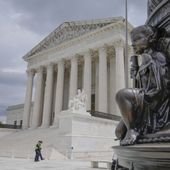ASSOCIATED PRESS
Environmental groups and the Bush administration defended a clean-air program yesterday in the Supreme Court, arguing that a power company must install costly pollution controls in its aging coal-fired plants.
An attorney representing Duke Energy Corp. said government regulators suddenly switched their interpretation of 26-year-old federal rules and sued the company six years ago. Lawyers for the environmental groups and the government said Duke and other utilities long ago understood federal requirements and chose not to comply with them.
The outcome of the case, Environmental Defense v. Duke Energy Corp., could affect power plants in 10 states where utility companies are challenging federal requirements. The plants are the remaining targets of more than a dozen lawsuits brought by the government against utilities since 1999.
Justice Antonin Scalia said it was “a little bit of an exaggeration” to argue that the regulations had always been interpreted in the way the government asserts, pointing to a government regulator who long ago interpreted it Duke’s way.
At issue is whether the 4th U.S. Circuit Court of Appeals had the authority to handle the case when it ruled in favor of Duke. Also in dispute is whether pollution emissions should be calculated hourly, as Duke wants, or annually, as the environmental groups say.
The enforcement program is aimed at reducing power plant emissions of nitrogen oxide and sulfur dioxide that contribute to smog and acid rain. Retrofitting aging coal-fired plants with the latest pollution control equipment is costing billions of dollars.
States where utility companies are challenging federal requirements are Alabama, Indiana, Kentucky, Ohio, Pennsylvania, North Carolina, South Carolina, Tennessee, Virginia and West Virginia.
The power plant lawsuit, among several initiated during the Clinton administration, was inherited by President Bush when he took office in 2001.
The Duke case’s origins date to the 1970s when Congress amended the Clear Air Act to require installation of expensive pollution equipment on newly constructed power plants. Lawmakers gave older plants a partial exemption, thinking that the power industry would be phasing out the older facilities.
Instead, the companies revamped their aging plants, enabling them to operate hours longer each day, resulting in production of more electricity and the emission of even more pollutants.
Justices also were hearing arguments yesterday about whether a two-year-old ruling that excludes witness statements to police from trials when the witnesses do not testify should apply to older cases.
An appeals court said the ruling was retroactive when it threw out Marvin Bockting’s 1988 conviction in Nevada for sexually abusing his 6-year-old stepdaughter. The girl’s statements to police were used to convict Mr. Bockting, but she did not testify at the trial.
The state appealed; other appeals courts have not applied the 2004 high court ruling retroactively.



Please read our comment policy before commenting.